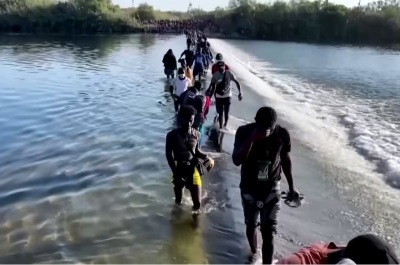Would Jesus champion illegal immigrants?

The battle of the border has become the battle of the buses ... and now planes.
Texas Gov. Greg Abbott has bussed thousands of illegal immigrants to Chicago, New York City and Washington D.C. Now, Florida Gov. Ron DeSantis has further stirred the pot, flying migrants to Martha’s Vineyard, causing a backlash from cities that have sanctimoniously declared themselves to be “sanctuary cities.” (The same big cities, ironically, becoming so impoverished, crime-ridden, politically leftist and dysfunctional that, one day, they might just staunch the flow of immigrants fleeing from those very conditions!)
It’s easy to forget that immigration is just as hot a topic in Europe, although — crucially — migration there is often more urgent than mere economic betterment. Refugees from war-torn nations (and now Russian conscripts) are flooding across borders, fleeing for their personal safety (historically highlighted by America’s shameful refusal of entry to Jews attempting to escape Nazi atrocities). If we could grasp the dire circumstances prompting such desperation, hopefully we would lift the barriers with our own hands!
There are, of course, the legitimate legal, political, and economic questions about immigration. Of what use are national borders unless there are rules for those seeking admission? And if normal immigrants must go through proper channels to be admitted, why should those who flaunt the rules be given a free pass? If, on principle, we should welcome all the oppressed of the world, what happens to sustainability?
Then again, there is the hypocrisy of opposing illegal immigration while happily benefiting from the hard-working, often first and second generation “illegals” who pick our crops, mow our lawns, build our houses, and provide other essential skills and services that lazy Americans aren’t willing to do.
Remember the WWJD bracelets, popular in the 1990’s? Undoubtedly, asking “What would Jesus do?” is the right idea. And the corollary “What would Jesus say?” surely has to be the final word on any matter … assuming he had anything to say. So, WWJD if he were in charge of immigration?
Would Jesus join those who argue for virtually open borders? Would he not affirm Emma Lazarus’ words on the Statue of Liberty: “Give me your tired, your poor, your huddled masses yearning to be free”? Surely, “Love your neighbor” must include the foreigner, just as it did for Israel. (In Joshua 20, weren’t “sanctuary cities” God’s idea, even if unrelated to immigration?) And didn’t Jesus welcome all comers, saying, “Come to me, all you who are weary and burdened, and I will give you rest”?
Yet, have you ever considered that even Jesus’ own kingdom has borders, and requirements for admission? “Not everyone who says, ‘Lord, Lord,’ shall enter the kingdom of heaven, only those who do the will of my Father (Matthew 7:21).” As Jesus explained to Nicodemus, “No one can enter the kingdom of God unless they are born of water and the Spirit (John 3:5).” While Jesus’ kingdom is open to all, it doesn’t have open borders. Are there any lessons to be learned about our own borders?
The problem with WWJD is that we can so easily become self-affirming ventriloquists, having Jesus say whatever we want him to say, especially on issues that He never directly addressed. What I personally would like Jesus to say is that there must be some way to devise reasonable rules that ensure safe and lawful entry for the less fortunate who can share in our unique freedom and abundance — all without our borders becoming so open that we end up losing the very freedoms and abundance that attract so many to our shores. Can our leaders not do that? Or is immigration simply too politically useful not to exploit?
If we let Jesus speak for Himself, there wouldn’t be a word about border politics, but plenty to say about the far greater importance of entering the Kingdom. (“Seek first the kingdom of God, and all the mundane needs you worry about will be supplied.”) More yet about the greatest of all risks — losing out on life eternal once we cross over … not the Rio Grande, but death’s Jordan.
F. LaGard Smith is a retired law school professor (principally at Pepperdine University), and is the author of some 35 books, touching on law, faith, and social issues. He is the compiler and narrator of The Daily Bible (the NIV and NLT arranged in chronological order).




























